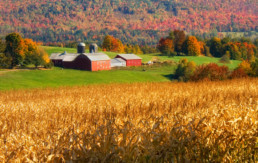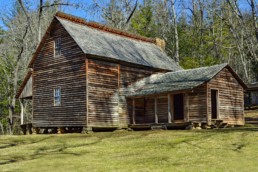5 Fun Facts About Louisville! | OIC Annual Meeting May 23-24
By Marci Ovadia, Senior Program Associate for Equity and Communications
Exploring Inclusive Prosperity in Louisville: Innovation, Systemic Change, and Funders’ Roles at the OIC Annual Meeting
Register Now!
May 23-24, 2018 | Louisville, Ky.
A resurgent post-industrial city that has become both a destination for the bluegrass-meets-craft bourbon crowd and an increasingly diversified economic hub, Louisville, Kentucky, is taking charge of both its future and its history in surprising ways. Recent media attention has focused on Louisville’s public commitment to creating a civic culture founded around the value and practice of compassion. Less apparent are the steps the city has taken to meld economic competitiveness goals with an agenda of economic inclusion. This conference will explore how innovations in Louisville’s metro government—often supported and even catalyzed by the philanthropic sector—are addressing systemic racial and other inequities in the city, and are leading to strategies that intentionally connect historically excluded neighborhoods and geographic communities to economic growth and opportunity.
A draft agenda will be available soon. Stay tuned for more details.
5 Fun Facts About Louisville
L ouisville Knows Bourbon
ouisville Knows Bourbon
95% of the world’s bourbon is produced in Kentucky!
You can learn more about this Kentucky spirit touring the Kentucky Bourbon Trail. Or, if you want to stay in Louisville city limits, check out the Urban Bourbon Trail
 Disco is Stayin' Alive in Louisville
Disco is Stayin' Alive in Louisville
Disco balls reign in this town. 90% of the disco balls in the USA are produced in Louisville by National Products on Baxter Ave.
 Louisvillians Love Their Southern Belle
Louisvillians Love Their Southern Belle
The oldest operating Mississippi-style steamboat in Louisville, the Belle of Louisville, is over 100 years old! Belle has been a National Historic Landmark since 1989, and is listed in the National Register of Historic Places. She moved around the country a bit before calling Louisville home and you can still cruise the Ohio River on this lovely historical boat.
 Fireworks Are Serious Business
Fireworks Are Serious Business
Louisville has the largest annual pyrotechnics show in the country aside from Independence Day. The launch of Kentucky Derby season comes in with a bang. Each year, people from all over flock to the Ohio River for Thunder Over Louisville, a pyrotechnic display involving 60 tons of firework shells.
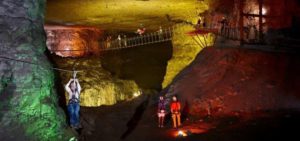 The Mega Cavern is a Reclaimed Limestone Quarry
The Mega Cavern is a Reclaimed Limestone Quarry
You've probably heard of the Louisville Zoo, but do you know that most of the zoo sits on top of the Louisville Mega Cavern? It’s a man-made cavern, originally a limestone quarry, and has been open to tourists since 2009. For the adventurous there are zip line tours, an underground bike park with over 320,000 square feet of trails (the only underground bike park in the world), an aerial ropes challenge course and, for the history buffs, there are historic tram tours.
Reserve Your Room Now!
The Funders' Network has reserved a block of rooms at the historic Brown Hotel in Louisville, Ky. There is a discounted room rate of $189 per night for attendees. To book your hotel room, call the hotel toll free at 502-209-7346. When calling to book your reservation, reference the Funders' Network group block.
The meeting will begin at 12 p.m. on May 23 and end at 2 p.m. on May 24.
Limited space will be available to attend the annual meeting of the Federal Reserve-Philanthropy Initiative, which will take place from 8 a.m. to 11:30 a.m. on May 23 at the Federal Reserve Bank of St. Louis, Louisville Branch.
An agenda will be circulated closer to the meeting date.
TFN Elects New Board Members at 2018 Annual Meeting
By Marci Ovadia, Senior Program Associate for Equity and Communications
TFN Elects New Board Members at 2018 Annual Meeting
The network also elected new officers and bid farewell to departing board members in Houston
The Funders’ Network is proud to announce the appointment of three leaders in philanthropy to the network’s board of directors: Jessica Boehland, senior program officer at The Kresge Foundation; Don Hickman, vice president for community and workforce development for the Initiative Foundation; and Elizabeth Love, senior program officer for Houston Endowment.
The new board members were officially named to the Funders’ Network Board of Directors on March 20, during our 2018 Annual Conference in Houston.
“We are excited to have Elizabeth, Jessica and Don join the TFN board of directors, bringing with them a wealth of experience and expertise from their impactful work as funders, “ said Board Chairperson Tom Woiwode of the Community Foundation for Southeast Michigan. “They have all demonstrated a deep commitment to TFN and the shared goals we have as funders to create communities that are more resilient, sustainable and equitable places to live. We look forward to working alongside them in their new roles as board members.”
Please join us in welcoming these new members of TFN's board of directors!
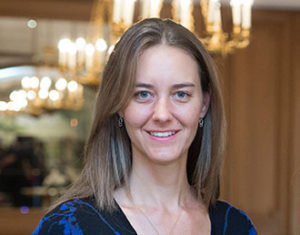 Jessica Boehland
Jessica Boehland
Jessica Boehland works as a senior program officer at The Kresge Foundation, which is committed to expanding opportunities in America’s cities. Kresge’s Environment Program seeks to help cities build their resilience in the face of climate change, with work focused on climate change mitigation, preparedness for the effects of climate change, and social equity. Jessica leads the team’s grantmaking and other activities related to energy efficiency, renewable energy, and energy resilience.
Jessica is also co-chair of TFN's GREEN! steering committee.
Prior to joining Kresge in 2008, Jessica served as managing editor of Environmental Building News and editor of GreenSource magazine. Her writing has appeared in these and numerous other publications. In 2017, Jessica was named among Midwest Energy News’ 40 Under 40, recognizing young leaders helping to drive America’s transition to clean energy. She serves on the board of the Environmental Grantmakers Association. Jessica holds a bachelor’s degree in Environmental Studies from Oberlin College and a master’s degree from the Yale School of Forestry and Environmental Studies.
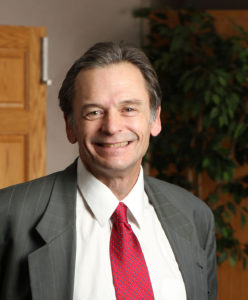 Don Hickman
Don Hickman
Don Hickman is the vice president for community and workforce development for the Initiative Foundation in Little Falls, Minn. He administers approximately $2 million in grants annually, and supervises the foundation’s programs to support community development, early childhood literacy and school readiness, new Americans and emerging entrepreneurs, and water quality protection or enhancement. He has been an active member of TFN since 2006 as a member of the River Partnership of Community Foundations and in the Philanthropic Preparedness, Resiliency, and Emergency Partnership (PPREP) cohort.
Prior to joining the Initiative Foundation, Hickman spent 10 years as an environmental consultant in Minnesota and Utah. Hickman has also served as a scientist and lobbyist with the Massachusetts Audubon Society, as a community organizer with the New England Rural Community Assistance Program, as a biologist with the National Park Service in Colorado, and as the water quality laboratory director for Gunnison County (Colorado). He received his undergraduate degree in biology from the University of Minnesota in 1982, and his master’s degree in Water Chemistry from Western Colorado State in 1986. He was working on a Ph.D. in aquatic ecology at Utah State University until he met his wife, who, Don says, "made him a better offer."
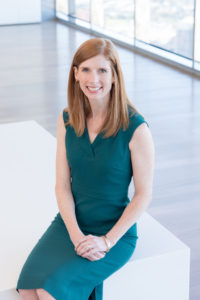 Elizabeth Love
Elizabeth Love
Elizabeth Love serves as senior program officer for Houston Endowment, a private philanthropic institution that seeks to enhance the vibrancy of greater Houston and advance equity of opportunity for the people who live here. Elizabeth oversees grantmaking for the foundation’s health and environmental portfolios as well as a portion of the arts and culture portfolio.
She most recently served as co-chair of TFN's 2018 Annual Conference in Houston.
Prior to joining the foundation in 2009, Elizabeth served as director of Harris County Public Health’s Office of Policy and Planning, where she led strategic planning activities concerning health promotion, infectious disease, air and water quality, neighborhood conditions, climate change and emergency response. In addition, Elizabeth oversaw the department’s legislative activities, community assessment processes and outcomes evaluation framework. In the late 1990’s, Elizabeth served as a fellow for the U.S. Centers for Disease Control and Prevention.
Elizabeth received a bachelor of arts degree from Rice University and a master’s degree from the University of Texas School of Public Health.
Fond Farewells
This year, we had five members departing the board. TFN would like to thank them for lending their time, talents and counsel to the network's board of directors.
“One of TFN’s many strengths is the commitment shown by funders like Elizabeth, Cheryl, Todd, Wendy and John,” said Tom Woiwode, who was named TFN's new board chairperson at the annual conference in Houston. “It has been an honor to work with them all these many years, and I’m especially grateful for John’s leadership as board chairman. Another of TFN’s strengths is the opportunity for funders to connect with the network in a variety of ways, so I have no doubt we’ll continue benefit from the insight and energy of these former board members.”
With gratitude, we recognize:
John Mitterholzer, Senior Program Officer, Environment, The George Gund Foundation and Former TFN Board Chairperson
Cheryl Casciani, Director of Special Projects, Baltimore Community Foundation and Former Treasurer, TFN Board of Directors
Wendy Lewis Jackson, Managing Director, Detroit, Kresge Foundation
Elizabeth Lynn, Executive Director, van Beuren Charitable Foundation
Todd Vogel, Managing Director, Loom Foundation
New Officers Elected
TFN's membership also elected a new slate of officers to serve on the board of directors. All of the officers serve one-year terms, except for the chairperson, who serves two years.
Chairperson: Tom Woiwode, Community Foundation for Southeast Michigan
Vice Chairperson: Craig Martinez, The California Endowment
Treasurer: Alece Montez, Orton Family Foundation
Secretary: Darryl Young, The Summit Foundation
After Harvey: A Young Poet's Words Will Meet the Music of Houston Grand Opera at #TFNHouston
By Marci Ovadia, Senior Program Associate for Equity and Communications
After Harvey: In Her Own Words, and Set to Music
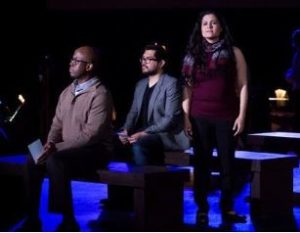 A slam operetta inspired by the words of Houston's youth poet laureate Rukmini Kalamangalam — and commissioned especially for TFN — will be front and center at TFN’s 2018 Annual Conference kicking off our annual conference in Houston on Monday, March 19th at 12:00 p.m. in the Phantom Ballroom.
A slam operetta inspired by the words of Houston's youth poet laureate Rukmini Kalamangalam — and commissioned especially for TFN — will be front and center at TFN’s 2018 Annual Conference kicking off our annual conference in Houston on Monday, March 19th at 12:00 p.m. in the Phantom Ballroom.
If you have not registered for conference yet, register now!
 Who will take the stage?Rukmini KalamangalamRukmini Kalamangalam, Houston's Youth Poet Laureate, is a senior at Carnegie Vanguard High School in Houston. She currently serves as Houston’s third youth poet laureate, is a youth poet laureate ambassador for the Southeast region of the United States, and was recently chosen as a finalist for the National Youth Poet Laureate Program. Kalamangalam’s work has been published in the Houston Chronicle, and she is a cultural arts advisor to the Mayor’s Youth Council. Kalamangalam, who emigrated to the United States from India with her family when she was 6, submitted a collection of poems and was chosen from dozens of applicants to be chosen for the poetry honor.
|
GOING PLACES: New Orleans - What do you do when you lose everything?
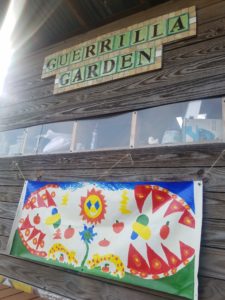 By Heather Smith, Senior Program Officer-Justice, The Field Foundation
By Heather Smith, Senior Program Officer-Justice, The Field Foundation
I didn’t set out to become an urban planner. I stumbled across it in college. As the deadline approached to choose a major. I was flipping through the course catalog and realized that almost all the courses I had taken to date added up to an urban studies major. Aha! And that’s when another realization set in. I adore analyzing systems. Transit. Parks. Housing. Garbage pickup. But what I encountered in real life urban planning, which the PLACES Fellowship highlighted, was a more insidious set of systems—institutional racism in the form of segregated housing systems. Planning systems that inevitably place toxic sites near poor communities of color. And a philanthropic system that all too often reinforces the institutional racism we all live under by “other-izing” the folks they are trying to help, not listening to their ideas for change, and funding top down efforts. All of this results in a system that consistently favors the white male dominated way of doing business. And for those questioning these systems it creates yawning gaps between how we operate on the surface and what we are really thinking. This impedes the work we do in philanthropy.
Which brings me to New Orleans. My PLACES Fellowship’s fourth and final site visit in December 2017 brought us to a city soaked in history, culture and food, and so many questions of racial equity. A place that shouldn’t work but does. Water above, dry land below. An implausible mix of culture, celebrations, community and food traditions all brewed together in a fantastic stew. Hurricane Katrina brought on the collapse of many of those urban systems, thus the story of Katrina now defines this city. In 2005 many residents lost everything. When every system failed-from transportation, to health care to the levies, flood victims were left only with our shared human systems.
Love.
Resilience.
And Justice.
The human resilience left behind was immensely powerful. And that continues, fourteen years later. Driving through the Lower 9th Ward where four out of five lots on each block are vacant made me realize how nearly every structure I saw was rebuilt with love and resilience, carving a path to justice. We heard stories of agony, of displacement, lost relatives, and a tightly woven culture in the Lower 9th Ward ripped apart by the flood. Residents talked about losing relatives who died far from home in Houston or losing their communities with five generations of family who all lived within a few blocks of each other. Yet through the tears I heard the beating heart of love and resilience. It keeps on through the loving welcome that Warrenetta Cheneau-Banks of Lower 9 Resilient brings to every volunteer group that visits even 14 years after the hurricane. It comes through in the tears she shed as she repeated her Katrina story for us. It lives on in the Backyard Gardeners Network which is doing “guerilla gardening.” They are staking territory in vacant lots and using food to revitalize the neighborhood while preserving its cultural heritage. They are cultivating stories of resilience and love by bringing young and old together over food. That resilience and love is what shapes the place today and is what endured for me long after my return home.
Listening is intrinsic to urban planning. This is also true in my current work in philanthropy. The Field Foundation’s new grant making direction has shifted its focus to community empowerment through justice, art and leadership investment. I am leading our justice portfolio which is focused on upstream, root cause issues with a racial equity lens. The foundation shifted its grantmaking to intentionally fund and listen to people of color in community understanding that narrative and storytelling is a key piece of justice. Justice is so broad it is hard to grapple with sometimes. Yet I’m trying to listen for it and to understand what it means through nearly every conversation I have—particularly those in divested neighborhoods and those voices of color that have been most marginalized. And I’m learning that sometimes the most powerful thing I can do is put down my phone, set aside my to do list, and listen.
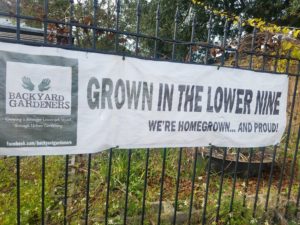 Many of the issues within justice are so urgent and so pressing that it is a challenge to build the space to think and reflect. Yet often the work of equity is how you do your work. It is not that the results or end product aren’t important. But there’s a craft to how one approaches the work. We all want “impact” in philanthropy but that can be elusive. But what we can do today is ground ourselves in equity. Dig deep. Find resilience from others and put equity at the center. Sometimes in the day to day that means going to someone’s office rather than having them travel downtown. For me it also means building space and time on the calendar to listen to what people in community are saying. Roxanne Franklin of the city of New Orleans talked about Equity New Orleans—the city’s approach to integrating racial equity through all city departments. As a Chicagoan coming from a patronage-based system I was incredulous and somewhat skeptical about this effort. However, she said that they couldn’t have gotten to this work without two years of racial healing work. This reinforced for me that the long road to racial equity is in the listening and building resilience.
Many of the issues within justice are so urgent and so pressing that it is a challenge to build the space to think and reflect. Yet often the work of equity is how you do your work. It is not that the results or end product aren’t important. But there’s a craft to how one approaches the work. We all want “impact” in philanthropy but that can be elusive. But what we can do today is ground ourselves in equity. Dig deep. Find resilience from others and put equity at the center. Sometimes in the day to day that means going to someone’s office rather than having them travel downtown. For me it also means building space and time on the calendar to listen to what people in community are saying. Roxanne Franklin of the city of New Orleans talked about Equity New Orleans—the city’s approach to integrating racial equity through all city departments. As a Chicagoan coming from a patronage-based system I was incredulous and somewhat skeptical about this effort. However, she said that they couldn’t have gotten to this work without two years of racial healing work. This reinforced for me that the long road to racial equity is in the listening and building resilience.
So here are my main takeaways from the PLACES Fellowship—and particularly the work of racial equity;
1) Stakeholder engagement is the work. One grantee was pitching an idea to me in justice during which she outlined the end goals and then talked about how she was engaging new racial and ethnic groups, and I said, “This IS the work.” The process of racial equity, and stakeholder engagement can be a powerful lever for change. Whether it is making physical space for community, granting dollars for community to have space to heal, or ensuring that there is a round table instead of the head of a table.
2) Take time to truly listen to the place. Funders often miss the stories that reside deep within the place. And often resilience, love and justice are in the listening. Every place and its soil is full of preconditions containing these racialized unequal structures and we must make it a practice to understand the stories on the road to justice.
3) Reflection is vital. When we are stressed out, we go to the status quo. Reflection often gets lost in the busyness. Yet being intentional about recording lessons learned can teach us how to deepen our listening. As I reflect on the PLACES Fellowship experience, the word that rises is gratitude: Gratitude for the grantees who are out in community making a difference every day, gratitude that I can actively wrestle with the big questions of justice and racial equity, and gratitude for the PLACES Fellowship for activating these conversations and building space for racial equity.
An enduring image for me is Lee Circle in New Orleans with the newly toppled Robert E. Lee statue now missing. Inside the traffic circle surrounded by grass now stands a statue-less pedestal. More than symbolic, the magnitude of the shift in the landscape of that place is palpable. Perhaps there are fissures within this structural racism. This image gives me a greater urgency to work towards racial equity. The PLACES Fellowship has helped me sharpen the tools to dig deeper, and I will carry these lessons with me as I learn to listen even more. These racialized systems can be altered—statues will fall, and worlds can change. They just need acts of love and resilience leading toward justice. Let’s listen for it.
Catch up on our last Going PLACES blog here.
 Heather Smith, PLACES Alumni 2017
Heather Smith, PLACES Alumni 2017
Senior Program Officer - Justice
Heather reviews and evaluates grant requests from Chicago area not-for-profit organizations. In addition to conducting site visits with applicants and making funding recommendations, Heather also manages the foundation’s internship program. Prior to Field, Heather served as the planning director for the congress for the New Urbanism and coordinated the Metropolis Plan activities for Chicago Metropolis 2020. She also received an American Planning Association fellowship to advance sustainable development and planning in the U. S. Senate. Heather is a member of Chicago Women in Philanthropy and the American Planning Association and serves on the Chicago Metropolitan Agency for Planning Land Use Committee. Heather is also an adjunct faculty member in DePaul University’s Geography Department and holds a master’s degree in urban planning from Columbia University and a bachelor’s degree in urban studies and Japanese from Macalester College. Heather enjoys biking, sailing, and traveling in her spare time.
Equity Work Takes Center Stage at #TFNHouston
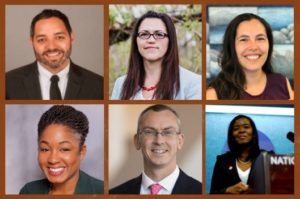
By Heather Smith, Senior Program Officer-Justice, The Field Foundation
Our PLACES alumni are taking center stage at TFN's 2018 Annual Conference — from a live storytelling event that will share firsthand accounts from the world of equity work, to participating in in-depth panels on topics such as resiliency, racial inequity and inclusive economies.
Take a look at some of the many ways alums of TFN's PLACES Fellowship will be sharing and guiding the conversation while we're in Houston March 19-21.
We invite you to join us for Speaking Truth to Power: Celebrating the Voices of PLACES at #TFNHouston, the first ever PLACES plenary at our annual conference on Tuesday, March 20 at 9:00 – 9:45 a.m. in the Phantom Ballroom.
If you have not registered for conference yet, register now!
Impact. That’s what every grantmaker seeks. But mention equity and diversity to the philanthropic community and often the conversation turns to the struggle of making outcomes match ideals. For nearly a decade, TFN’s PLACES Fellowship has been giving leaders in philanthropy the tools they need to embed equity into both their professional and personal lives. Join us for a live storytelling experience as PLACES alumni share their firsthand accounts about leaving their comfort zones to ask the hard questions — of their work, their world, and themselves.
Moderator:
Craig Martinez, Program Manager, Neighborhoods, The California Endowment (PLACES Alumni 2013)
Storytellers:
Alece Montez, Director of Programs, Orton Family Foundation (PLACES Alumni 2013)
Mac Howison, Program Officer, Creative Learning, Heinz Endowment (PLACES Alumni 2016)
Mekaelia Davis, Program Officer, Prudential Foundation (PLACES Alumni 2017)
Kris Archie, Executive Director, The Circle (PLACES Alumni 2016)
Evelyn Burnett, Vice President of Economic Opportunity, Cleveland Neighborhood Progress (PLACES Alumni 2011)
Fourth Annual PLACES Alumni Gathering
Sunday, March 18
12:00 p.m. - 5:30 p.m.
Emancipation Park
Meet in the lobby at 11:30 a.m. to take buses to Emancipation Park, 3018 Emancipation Avenue. We will return to the hotel at 5:30 p.m.
As conscious funders looking to practice deep equity, we engage in learning that helps us apply a multitude of systems, organizing, and social change models. Deep equity, however, also requires that we pay attention to our hearts, our heart-mind connection, and our behaviors. It may feel that the urgency of social and world situations calls on us to forego the self-work, yet cultural, historical, spiritual and neuroscience evidence shows us that self-awareness is a great tool to help us approach situations without the cloud of judgment and isolated experience that often results in blinders and walls. This session is focused on brining mindfulness and self-care to our work in advancing equity.
Highlights include:
| Opening session designed to center fellows on bringing self-care practices and mindset to the work of equity |
| Facilitated learning sessions on advancing racial equity in our own institutions. Topics include: communications, grantmaking, managing up, building alliances, establishing trust with community partners |
Speakers Include: Dion Cartwright of The Funders' Network(PLACES Alumni 2011), Eureka Gilkey of Project Row Houses, Michelle Knapik of Emily Hall Tremaine Family Foundation, Bina M. Patel of Saathi Impact (PLACES Alumni 2012), and Sheena Solomon of The Gifford Foundation(PLACES Alumni 2012).
| Please note: this event is for alumni only |
| Materials for the alumni gathering can be found here |
Putting Equity to Action: Facilitated Learning Session
Monday, March 19
8:00 a.m. - 11:30 a.m.
Hemingway Room
Facilitator: Bina M. Patel from Saathi Impact (PLACES Alumni 2012).
PLACES Read Between the Wines Book Club
Tuesday, March 20
5 :15 p.m. - 6:15 p.m.
:15 p.m. - 6:15 p.m.
Ultimate Ransom Room
Don’t miss out on the PLACES Read Between the Wines Book Club: Join fellow PLACES alumni for a glass of wine to discuss this year’s book club selection, The Color of Law: A Forgotten History of How Our Government Segregated America.
Alumni @ Conference
|
|
|
PLACES alumni will be participating throughout the conference. Here are the sessions that will have alumni participating as speakers and/or moderators: Pre-Conference Institute: Resilient People, Resilient Places: Spotlight on SolutionsMonday, March 19, 9:00 a.m. Collaborative Efforts to Address Racial Inequities in the CommunityMonday, March 19, 2:00 p.m. Lost in Translation: The Importance of Intermediaries in Anchor PartnershipsTuesday, March 20, 10:15 a.m. Defining an Inclusive Economy, Measuring Success and Changing BehaviorsTuesday, March 20, 10:15 a.m. PLACES Pro-Tip: Don't forget to stay for our closing plenary with nationally renowned speaker and policy maker focusing on social and environmental justice issues, Mustafa Santiago Ali. He will be introduced by Tyler Nickerson of The Solutions Project (PLACES Alumni 2017). |
|
For the 2018 TFN Annual Conference PLACES schedule of events, click here. |
Improving Health And Equity While Addressing Climate Change
By Jeff Wise, Program Director, Health and Environmental Funders Network
Health Affairs recently published this blog by Jeff Wise of Health and Environmental Funders Network discussing how to improve health and equity while addressing climate change.
This post came after the November 2017 meeting in Detroit, Michigan: "Charting a Climate, Health, and Equity Agenda", a gathering of five funder networks that convened almost eighty funders from across the sector to discuss the relationships between climate, health, and equity work in the field.
"Foundations are often criticized for "working in siloes”—approaching complicated social problems through a narrow lens. For a complicated issue like climate change, which has multiple causes and consequences, considering that bigger picture may point to solutions. This idea was highlighted by the Lancet Commission on Climate and Health, which pointed to climate change as being simultaneously a threat to fifty years of public health gains and this generation’s greatest public health opportunity."
Read the full blog, click here.
The Funders' Network co-sponsored this event.
____________________________
Jeff Wise joined HEFN as its Program Director in 2015. He’s responsible for directing the organization’s issue related work. From toxics to fracking and from drinking water to climate change and health, Jeff directs HEFN’s events and programs in these areas and helps HEFN members collaborate on strategy. Jeff comes to HEFN with deep experience in environmental policy and advocacy. After having served as associate director of global environmental affairs at the White House, Jeff was the policy director for the National Environmental Trust where he managed many of the organization’s environmental health campaigns. Most recently, Jeff directed several environmental projects at the Pew Charitable Trusts, and he directed the nonprofit and foundation advocacy training program at the Alliance for Justice. Jeff holds a J.D. from Stanford Law School, an M.A. in natural resource economics from Stanford, and a B.A. in English Literature from Brown.
7 Reasons To Eat Here! At #TFNHouston
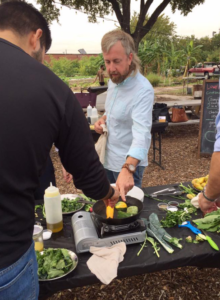
By Ashley Quintana, Senior Program Associate for Sustainability and Environmental Programs
TFN’s 2018 Annual Conference will bring plenty of opportunities to learn and explore Houston —including the region’s thriving food culture.
We are delighted to once again feature our annual dining extravaganza Eat Here! on Tuesday March 20 from 6:30 - 9:00 p.m. at McGovern Centennial Gardens, a centerpiece of the city's Hermann Park Conservancy and one of the city's most historically significant green spaces. This fun strolling dinner features local farmers, providers, and chefs who place a special emphasis on health, justice and sustainability. The Eat Here! dinners began in 2003 as an effort to link the issues of sustainable agriculture/food with smart growth, urban renewal, rural development, land use, and transportation. The dinner will feature six food vendors serving tapas style dishes – appetizers, entrees, and desserts with vendors representing a diversity of dishes, ethnicities, cultures, and points of entry into the food system, providing a holistic, nutritious, and delicious meal representative of the region. Each vendor will be serving both vegetarian and non-vegetarian dishes highlighting locally sourced produce and meat. Our hope is that the funders will leave inspired by a meal prepared by good folks working in various aspects of community development through something that connects us all, food and health.
We’ve teamed up with Houston-based Urban Harvest, a leader in the local food movement, to curate this signature TFN Annual Conference event.
Don't miss out on this celebration of local food: Register today for TFN's 2018 Annual Conference!
Curious for a sneak peek of this year's Eat Here! menu? Take a look at our highlights below.
Meet the Vendors!
Little Kitchen HTX
Winner of Edible Houston's 2017 Local Hero Award for Best Food Artisan, Becca Reyenga of Little Kitchen HTX started her business after seeing the mass appeal and demand for her mom's homemade pralines. Reyenga's mom, Ruth Ann, is a Louisiana native, and has been making these delicacies for years.
El Topo Food Truck
"We use happy, sustainable, seasonal ingredients and we waste nothing. The deep flavors of our food are borne from the complexity and quality of our ingredients," said Tony Lurhman, who named his food truck El Topo, in honor of a 1970's psychedelic Mexican western he saw in film school. "Oh, and we make everything. We cure our bacon, we press our tortillas, we render our lard. This is the only way, we feel, that we can call the food ours."
Relished Taste of Africa
Owner, educator, and chef at Relished Africa, Josine Kagoyire (Ms. K), was born and raised in Rwanda. It was there that she learned to cook at an early age by watching her mother. Through her mother’s expertise in farming and knowledge of horticulture, Josine also developed a keen interest in growing her own food. Through her travels to various countries, she has adopted distinct cooking techniques, often using exotic spices, producing delicious flavors that keep people coming back for more.
Ripe Cuisine
Chef Stephanie Hoban, a native Houstonian with a passion for promoting the benefits of a plant-based diet and making it accessible to the people of Houston by way of delicious, homemade meals. In 2013, Stephanie began offering meals at a pop-up restaurant at the Urban Harvest Farmers Markets. Customer response was so overwhelmingly positive that in early 2014, encouraged by customers to expand her nascent operation to a food truck, she raised $12,000 through Kickstarter. A few months later, Ripe’s food truck served its first customers.
Food Music Life Food Truck
Chef and owner Casey Guhl started the Food Music Life food truck in 2015 and Green House Catering in 2014, with a determination to serve locally sourced cuisine using a basic Italian approach. Chef Casey went to culinary school in Florence, Italy and worked in kitchens for more than a decade prior to opening his catering company and food truck. He credits this time with helping him to learn the importance of using quality ingredients. Once in Houston, he realized he had an opportunity with the food truck to highlight not only local food and farms, but also emerging street artists from the local art community. The food truck has been painted with the works of seven Houston artists so far, including 13 Empires' mural Garden of Eden.
Breaking Bao Food Truck
"I saw bao as the perfect vessel for flavors. It’s fun to eat. From it’s texture, flavor, and handheld size, it has great versatility and addictive qualities," said Phillip Kim, a Korean-American chef whose food truck, Breaking Bao, recently won first place at the Houston Rodeo Uncorked! Wine and Best Bites. "I love that cooking is an open book. There are no right or wrong answers. In the end if it tastes good, you can’t hate on it."
_______________________________________
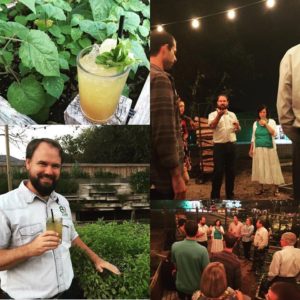 Don't forget to join us a garden tour!
Don't forget to join us a garden tour!
6 p.m. March 20
Join us right before the Eat Here! local food showcase for a tour of the Family Garden at McGovern Centennial Gardens with Daniel Milliken, lead horticulturist of this extraordinary Houston landmark. The Family Garden is an edible, interactive garden designed to showcase vegetables, herbs, fruit, citrus, and berries that can be grown successfully in the Houston area. Throughout the year, Houston children of all abilities are invited to participate in cultivating these beds, and to experience the touch, the scents, the colors, and the taste of fresh vegetables and herbs.
If you’re joining us for the tour, please gather in the lobby of the Hotel Zaza by 5:45 p.m. for the short walk to McGovern Centennial Gardens.
_______________________________________
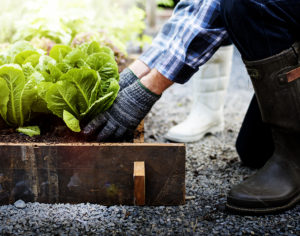 About Urban Harvest
About Urban Harvest
TFN is excited to work with Tyler Horne, director of farmers markets for Urban Harvest, to develop this year's Eat Here! event.
Founded in 1994, Urban Harvest is a leader in the local food movement and encourages community, good nutrition and sustainability through the teaching and support of organic gardening.
Want to learn more about Urban Harvest? Tyler and his team will be on hand at Eat Here! to answer any questions you might have about sustainable agriculture and food culture in the Houston region.
2018 Affinity Equity Summit and Solidarity Defense & Action Funder Briefing
By Ann Fowler Wallace, Director of ProgramsHappy 2018! On behalf of more than 20 affinity partners, we are very excited to invite you to join us for the Solidarity Defense & Action Funder Briefing, which will take place on February 12 & 13 in Oakland, CA. To register, click here.
We are excited to already confirm some amazing individuals that will be joining us, including Rodney McKenzie, Vice President, Demos, who hasseveral years of grassroots experience in the LGBTQ and faith communities, and Elizabeth Barajas-Roman, the new CEO of the Solidago Foundation, who has been a leader across sectors on health, gender, and immigration issues. Head to the event website to learn more about the Briefing and get registered today!
In Solidarity, Ann Fowler Wallace, Director of Programs, Funders' Network |
Upcoming Webinar | Asset-based economic development: examining our forest and farmed landscapes for their ecosystem and economic values
By Ann Fowler Wallace, Director of ProgramsYou are invited to participate in a Funders' Network for Smart Growth and Livable Communities' Webinar with special invites to the Northeast Funders' Network, which will take place on Monday, February 12, 2018 from 2:00 p.m. - 3:00 p.m. ET. To register for this webinar, click here. |
|
There has been a gradual evolution in how we think about and value our natural assets in the forested and farmed landscapes of the Northeast to consider their conventional economic value (wood products, fiber, food) and their value as provider of critical recreational and ecosystem services to rural and urban communities alike. By testing new approaches to conservation- and asset- based economic development across scales and across the geography of the Northeast, practitioners, academics, foundations, and mission driven investors are creating new ways to support land conservation, ecosystem services, and sustainable businesses. These new approaches, in turn, can provide a broad array of benefits and greater opportunities to people living and working in these places, as well as to our urban neighbors. This webinar will look at how and where this new thinking and strategies are being deployed and how the philanthropic community might help to increase investment in innovative and sustainable economic development . The webinar will look back to examine the historical context of landscape-scale conservation in the region. It will review the diverse assets in our forest and farm communities and more expansive ways of valuing these economic and ecosystem services, locally and regionally, provided by both large-landscapes such as the Northern Forest and more fragmented landscapes. Webinar presenters will share what science tells us about the condition of these assets, in light of a changing climate and increased land development, and explore policies and practices to help conserve and sustainably manage them for people and nature over the long-term. They will also explore the barriers and questions that need to be addressed to help realize the promise of conservation and resource-based community economic development. Speakers will present examples of how conservation organizations, economic development interests, public health entities, small towns, rural communities, cities and urban regions are beginning today to work together more closely toward conservation and community goals. Speakers: Peter Stein, Managing Director, The Lyme Timber Company Brad Gentry, Senior Associate Dean of Professional Practice, Yale School of Forestry & Environmental Studies Kathy Lambert, Science & Policy Integration Project Director, Harvard Forest, Harvard University. Please register for this call by Wednesday, February 7 to be sure you receive the webinar details. The registration form will provide an opportunity to submit questions that you would like the speakers to address, which we will share with speakers in advance of the call. Webinar information and further background materials will be emailed to registrants on Friday, February 9. For more information on this webinar contact Ashley Quintana at ashley@www.fundersnetwork.org or Hooper Brooks at hooper@www.fundersnetwork.org. |
Going PLACES: Home and Identity in Appalachia
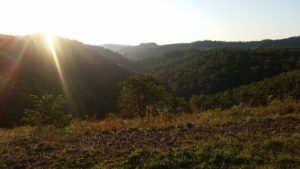 As a PLACES Fellow, the relationship between place and identity has been central to our lessons on realizing equity. Our recent visit to Charleston, West Virginia – self-proclaimed capital of the Appalachian Mountains – highlighted the complexity, and importance of this relationship. The city is rich with beauty and surrounded by scenery that gives you reason to pause and breathe deeply (something I am especially grateful for, as a New Yorker.) It’s easy to understand the deep pride and identity residents have developed with their city.
As a PLACES Fellow, the relationship between place and identity has been central to our lessons on realizing equity. Our recent visit to Charleston, West Virginia – self-proclaimed capital of the Appalachian Mountains – highlighted the complexity, and importance of this relationship. The city is rich with beauty and surrounded by scenery that gives you reason to pause and breathe deeply (something I am especially grateful for, as a New Yorker.) It’s easy to understand the deep pride and identity residents have developed with their city.
For generations, Charleston’s vitality and identity has been directly connected to coal mining. Like many places, the unique economic engine of the region drives more than people’s income – it has informed and shaped their culture. It wasn’t long into our trip before we saw the effects of the well-documented challenges facing the coal economy. Throughout our visit, we heard from city leaders who consistently expressed how integral it’s been to keep Charleston focused on the future and what the city is becoming – not only what it has it been. This requires a willingness to consider and embrace a new identity – one that is built on present realities.
Many cities around the country are navigating a similar experience – attempting to create a new identity for themselves. This, at a time when technological shifts and labor markets disruptions are forcing local communities to redefine what they are known for and what makes them viable places to live, work and play. Our experience in Charleston made clear, that communities who chose to redefine themselves must do so in a manner that includes the present and experienced identities of residents, and an understanding of how the systems and institutions that have been designed to serve them map those identities.
 True to definition, residents in Charleston may claim one of many different identities – representing an intersectionality that their city (like many others) must account for to achieve equity. What does it mean for systems in Charleston to support residents who may identify as Appalachian and gay and/or underemployed and/or managing substance abuse and/or a member of a faith-based community? Given these identities, how do you generate economic development and produce quality jobs in a region that is recovering from over-dependence on a singular industry? The answers to these questions may help Charleston’s leaders identify what comes next for a city with traditional and emergent identities.
True to definition, residents in Charleston may claim one of many different identities – representing an intersectionality that their city (like many others) must account for to achieve equity. What does it mean for systems in Charleston to support residents who may identify as Appalachian and gay and/or underemployed and/or managing substance abuse and/or a member of a faith-based community? Given these identities, how do you generate economic development and produce quality jobs in a region that is recovering from over-dependence on a singular industry? The answers to these questions may help Charleston’s leaders identify what comes next for a city with traditional and emergent identities.
The leaders we met in Charleston see a life beyond coal. “We decided to focus on solutions and not just confrontation,” said Matt Wasson from Appalachian Voices (AV). AV is a twenty-year-old advocacy organization that works to engage and uplift citizens across Appalachia on decisions that affect their families and communities. Their work has helped elevate the significance and value of living and working in the Appalachian Mountains. Through partnerships, AV aims to advance policies and programs that create economic opportunity for residents in Appalachia – like investigating the region’s potential for a robust solar industry. Yet others are actively creating brand new industries. Dr. Rusty Kruzelock of the West Virginia Regional Technology Park gave us an up-close look at the Green Mining Model Business Program. The initiative creates jobs and business opportunities for former miners and other related trades, through the creation of a 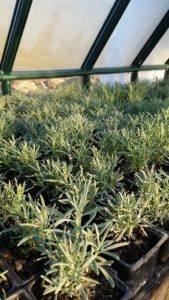 lavender farm. With the global essential oil market projected to reach $11.1B in the next five years – could Charleston be the next lavender capital of America?
lavender farm. With the global essential oil market projected to reach $11.1B in the next five years – could Charleston be the next lavender capital of America?
These promising solutions mirror the actions of conservation groups and funders who are committed to clean energy in the U.S. Dillon, my Lyft driver at the airport, took time to share his family’s rich history in mining and how it’s defined their traditions and beliefs. This cannot be unique to just Dillon. Despite any solutions created by concerned stakeholders, residents must see themselves as a part of these efforts, if they are to be successful. Will former miners be interested in working in the essential oil or solar industry? Will they want to build the relevant new skills? Political discourse on environmental and energy issues make it hard for communities to navigate rhetoric and fact. So much so, that there is a stubborn belief that coal will make a comeback. Miners who know that coal still exists in their hometown may not be interested in retraining. However, the city’s livelihood is inextricably tied to its identity as a home for coal.
For most, our first instincts about identity are originated at home. The uniqueness of where we live and how we experience the environment around us, can profoundly shape the identity we carry into the world. While we may hold multiple identities – our PLACES experience in Charleston made one thing abundantly clear – regardless of how a person defines themselves – the place they choose to live, should create opportunities for them to live their best life.
About the Author:
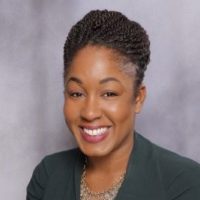 Mekaelia Davis is the Program and Policy Strategist at Prudential Financial and a 2017 TFN PLACES Fellow.
Mekaelia Davis is the Program and Policy Strategist at Prudential Financial and a 2017 TFN PLACES Fellow.



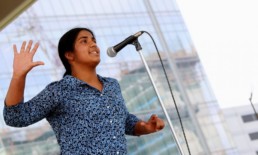

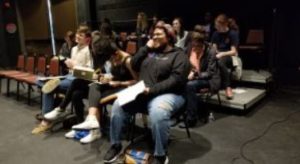 Writers In The Schools (WITS)
Writers In The Schools (WITS)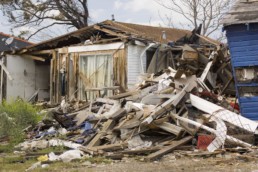
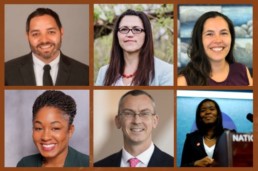

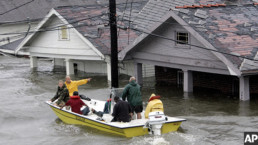
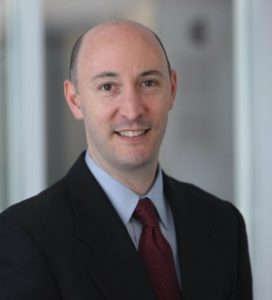 Jeff Wise
Jeff Wise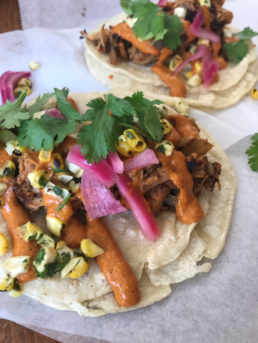
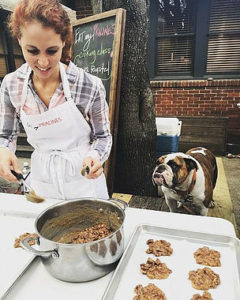
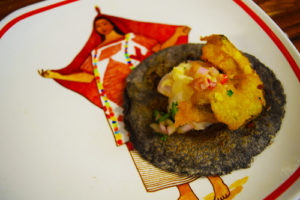



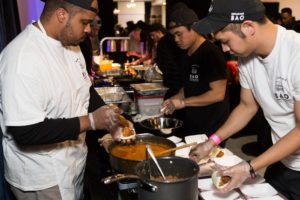

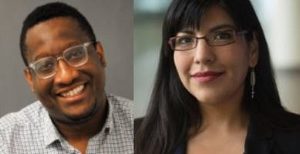 This joint funder briefing will be a unique opportunity to interact with funders across multiple sectors. Ignite speeches from thought leaders, ad hoc conversations on litigation and communications strategies, and facilitated workshops will all be included as part of the agenda. The ultimate goal of the Briefing will be to come together and shape strategies that defend and move forward efforts to protect people, place and planet.
This joint funder briefing will be a unique opportunity to interact with funders across multiple sectors. Ignite speeches from thought leaders, ad hoc conversations on litigation and communications strategies, and facilitated workshops will all be included as part of the agenda. The ultimate goal of the Briefing will be to come together and shape strategies that defend and move forward efforts to protect people, place and planet.